Deck 4: Data Analysis Equivalent Electrical Circuits
Question
Question
Question
Question
Question
Question
Question
Question
Question
Question
Question
Question
Question
Question
Question
Question
Question
Question
Question
Question
Question

Unlock Deck
Sign up to unlock the cards in this deck!
Unlock Deck
Unlock Deck
1/21
Play
Full screen (f)
Deck 4: Data Analysis Equivalent Electrical Circuits
1
For the following circuit, determine the impedance at a frequency of 0.1 Hz. ZRe = __________ and ZIm = ____________
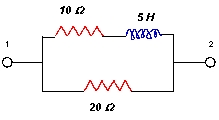

6.81 (from 6.7 to 6.9) , 1.38 (from 1.3 to 1.5)
2
For the following circuit, determine the impedance at a frequency of 1 Hz. ZRe = __________ and ZIm = ____________
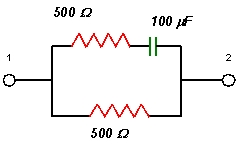

429 (from 420 to 440), 113 (from 103 to 123)
3
Charge transfer resistance is the value of faradaic impedance at _____
A) infinite frequency
B) zero frequency
C) open circuit potential
D) large dc bias
A) infinite frequency
B) zero frequency
C) open circuit potential
D) large dc bias
A
4
An impedance spectrum of an electrochemical system can be modeled using the following circuit. Then , Rt = _________ and Rp = ________
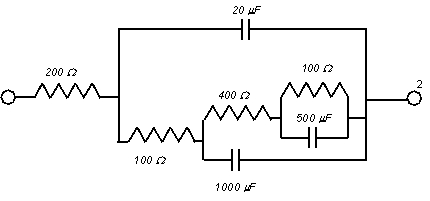


Unlock Deck
Unlock for access to all 21 flashcards in this deck.
Unlock Deck
k this deck
5
An impedance spectrum of an electrochemical system can be modeled using the following circuit. Then , Rt = _________ and Rp = ________
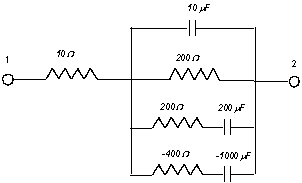


Unlock Deck
Unlock for access to all 21 flashcards in this deck.
Unlock Deck
k this deck
6
An impedance spectrum of an electrochemical system can be modeled using the following circuit. Then , Rt = _________ and Rp = ________
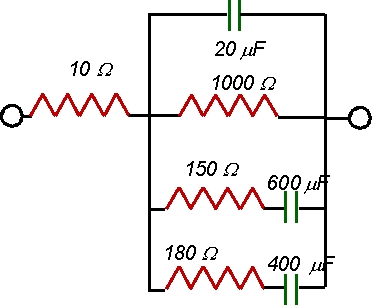


Unlock Deck
Unlock for access to all 21 flashcards in this deck.
Unlock Deck
k this deck
7
An impedance spectrum of a system is given below. The polarization resistance is _____
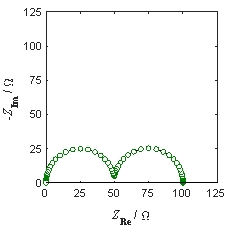


Unlock Deck
Unlock for access to all 21 flashcards in this deck.
Unlock Deck
k this deck
8
From Bode plot, estimate charge transfer resistance _______ and polarization resistance ___________
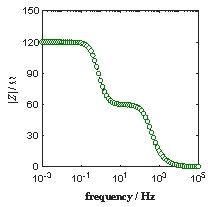
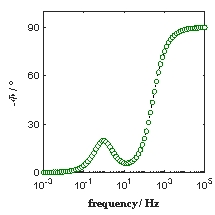



Unlock Deck
Unlock for access to all 21 flashcards in this deck.
Unlock Deck
k this deck
9
An impedance spectrum of a system is given below. The charge transfer resistance is _____
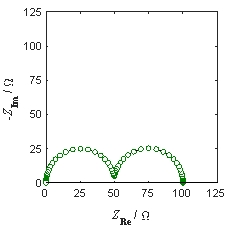


Unlock Deck
Unlock for access to all 21 flashcards in this deck.
Unlock Deck
k this deck
10
An impedance spectrum of a system is given below. The charge transfer resistance is _____ and polarization resistance is _____
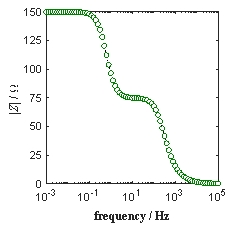
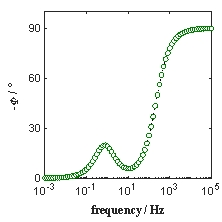



Unlock Deck
Unlock for access to all 21 flashcards in this deck.
Unlock Deck
k this deck
11
An impedance spectrum of a complex reaction is acquired at open circuit potential. The real part of the impedance can exhibit negative differential resistance..

Unlock Deck
Unlock for access to all 21 flashcards in this deck.
Unlock Deck
k this deck
12
The type of circuit given below is known as 
A) Maxwell circuit
B) Ladder circuit
C) Voigt circuit
D) Randel's circuit

A) Maxwell circuit
B) Ladder circuit
C) Voigt circuit
D) Randel's circuit

Unlock Deck
Unlock for access to all 21 flashcards in this deck.
Unlock Deck
k this deck
13
The type of circuit given below is known as 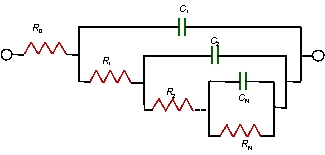
A) Maxwell circuit
B) Ladder circuit
C) Voigt circuit
D) Randel's circuit

A) Maxwell circuit
B) Ladder circuit
C) Voigt circuit
D) Randel's circuit

Unlock Deck
Unlock for access to all 21 flashcards in this deck.
Unlock Deck
k this deck
14
When multiple circuits are evaluated to model a data, the best fit model should be selected based on
A) least number of parameters
B) least residual sum squared
C) least residual sum
D) Akaike information criterion
A) least number of parameters
B) least residual sum squared
C) least residual sum
D) Akaike information criterion

Unlock Deck
Unlock for access to all 21 flashcards in this deck.
Unlock Deck
k this deck
15
An impedance spectrum containing 80 data points was fitted with different circuit models. The number of adjustable parameters in each model and the residual sum squared errors are listed below.
The best-suited model should be chosen based on the least value of
A) RSS
B) Akaike Information criterion (AIC)
C) corrected AIC
D) none of the above
The best-suited model should be chosen based on the least value of
A) RSS
B) Akaike Information criterion (AIC)
C) corrected AIC
D) none of the above

Unlock Deck
Unlock for access to all 21 flashcards in this deck.
Unlock Deck
k this deck
16
The following two circuits are equivalent. The values of R1 and R2 are (i) R1 = __________ (ii) R2 = ________________

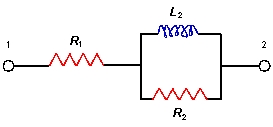



Unlock Deck
Unlock for access to all 21 flashcards in this deck.
Unlock Deck
k this deck
17
The following two circuits are equivalent. The values of R1 and R2 are (i) R1 = __________ (ii) R2 = ________________
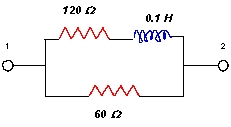
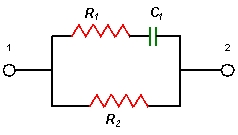



Unlock Deck
Unlock for access to all 21 flashcards in this deck.
Unlock Deck
k this deck
18
The following circuit can model an impedance spectrum perfectly.
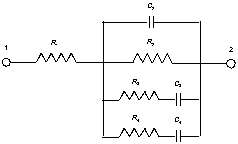
Which other circuits can model the data equally well?
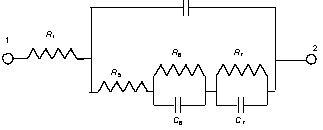 (Circuit-1)
(Circuit-1)
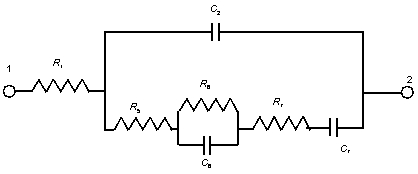
(Circuit-2)
A) only Circuit-1
B) only Circuit-2
C) both Circuit-1 and Circuit-2
D) neither Circuit-2 nor Circuit-2

Which other circuits can model the data equally well?
 (Circuit-1)
(Circuit-1)
(Circuit-2)
A) only Circuit-1
B) only Circuit-2
C) both Circuit-1 and Circuit-2
D) neither Circuit-2 nor Circuit-2

Unlock Deck
Unlock for access to all 21 flashcards in this deck.
Unlock Deck
k this deck
19
The following circuit can model an impedance spectrum perfectly. 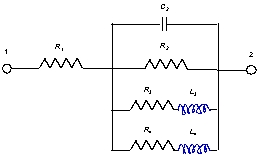
Which other circuits can model the data equally well?
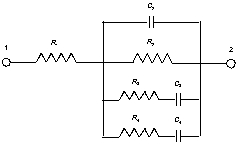 (Circuit-1)
(Circuit-1)
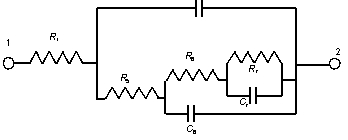 (Circuit-2)
(Circuit-2)
A) only Circuit-1
B) only Circuit-2
C) both Circuit-1 and Circuit-2
D) neither Circuit-2 nor Circuit-2

Which other circuits can model the data equally well?
 (Circuit-1)
(Circuit-1) (Circuit-2)
(Circuit-2)A) only Circuit-1
B) only Circuit-2
C) both Circuit-1 and Circuit-2
D) neither Circuit-2 nor Circuit-2

Unlock Deck
Unlock for access to all 21 flashcards in this deck.
Unlock Deck
k this deck
20
The following impedance spectrum is to be modeled.
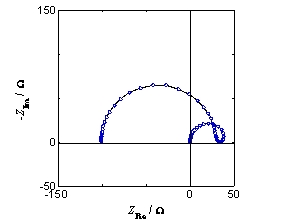
Among the following circuit choices, which one can be used to model the data?
A)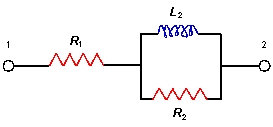
B)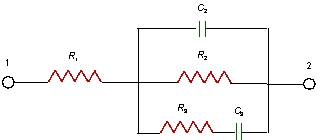
C)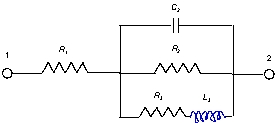
D) none of the above

Among the following circuit choices, which one can be used to model the data?
A)

B)

C)

D) none of the above

Unlock Deck
Unlock for access to all 21 flashcards in this deck.
Unlock Deck
k this deck
21
The following impedance spectrum is to be modeled.
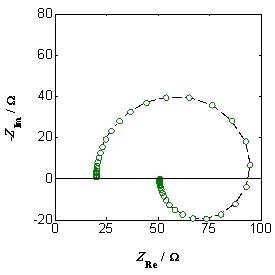
Among the following circuit choices, which one can be used to model the data?
A)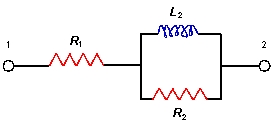
B)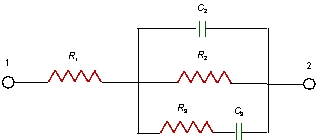
C)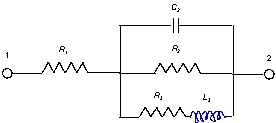
D) none of the above

Among the following circuit choices, which one can be used to model the data?
A)

B)

C)

D) none of the above

Unlock Deck
Unlock for access to all 21 flashcards in this deck.
Unlock Deck
k this deck



